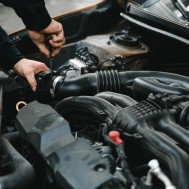Harsh chemicals, high engine temperatures and outdoor weather conditions experienced by automotives require durable sealing devices. Automotive seals must be carefully designed with materials that are compatible with automotive fluids and offer excellent resistance properties.
There are a number of rubber elastomers that are used in automotive applications today. Here’s a closer look at the top five materials that you should consider for automotive applications.
1. Fluorocarbon (Viton®)
Fluorocarbon, also known as Viton®, offers desirable working properties that make it ideal for a universal o-ring material. Base-resistant grades of fluorocarbon effectively seal against amine-based oil protectants that are found in new transmission oils. High fluorine grades of fluorocarbon offer greater resistance to swell in high octane and oxygenated fuel blends, which gives it superior sealing performance in ethanol/methanol blended gasoline applications. Additionally, fluorocarbon offers excellent high temperature resistance, with standard compounds ranging from -13° to +446°F.
Because of its desirable mechanical properties, fluorocarbon is an ideal material for automotive applications. Fluorocarbon is most often used in:
- Automotive fuel handling systems
- Aircraft engine seals
- High temperature/low compression set applications
2. Nitrile (Buna-N)
Nitrile, or Buna-N, is one of the industries most economical elastomers. In automotive applications, nitrile is able to seal against petroleum-based oils and fuels, as well as silicone greases and hydraulic fluids. With standard compounds offering temperature resistance of -40° to +257°F, nitrile seals can handle high engine temperatures, as well as cold temperatures outside during winter months.
Nitrile is frequently used for:
- Off-road equipment
- Automotive seals
- Aircraft fuel systems
3. Fluorosilicone
Fluorosilicone is most often used in aerospace applications, but it still offers excellent working properties for automotive seals. In fact, fluorosilicone is becoming an increasingly popular material for a wide range of industries. Fluorosilicone offers excellent high and low temperature resistance, with standard compounds ranging from -75° to +400°F.
Fluorosilicone effectively seals against fuels and oils, making it a key performer in automotive applications. This material is also suitable for prolonged exposure to air, sunlight and ozone that is frequently experienced by automotive seals.
4. Ethylene-Propylene
Ethylene-Propylene has gained widespread acceptance as an effective sealing material for its ozone and chemical resistance properties. When it comes to temperature resistance, ethylene-propylene matches up to its competitors, with standard compounds ranging from -40° to +275°F and specially formulated compounds ranging from -67° to +302°F. When ethylene-propylene is compounded using peroxide curing agents, it’s able to withstand temperatures up to +350°F.
Ethylene-Propylene is frequently used in:
- Outdoor weather resistant seals
- Automotive brake systems
- Automobile cooling systems
- Low torque drive belts
5. Perfluoroelastomer (FFKM)
Perfluoroelastomer, also referred to as FFKM, is commonly used in automotive applications because of its exceptional resistance to degradation normally caused by aggressive fluids or gases. In fact, FFKM can resist attacks by virtually any chemical, including automotive lubricants, fuels and additives. Offering high temperature resistance, FFKM seals can withstand temperatures ranging from -13° to +600°F.
FFKM seals are commonly used in chemical and petroleum industries. However, it’s excellent resistant properties make it well suited for automotive applications.
Want to learn more about automotive seals?
Contact an engineer today.
